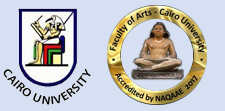عنوان المقال عربي
كتاب " السياسة في تدبير الرياسة المعروف بسر الاسرار" المنحول إلى أرسطو: قراءة في بعض الإشكاليات
Disciplines
Classics
Document Type
Original Study
Keywords English
Aristotle and Alexander, Secret of Secrets, physiognomy, Mirror for princes
كلمات مفتاحية عربي
أرسطو والإسكندر, سر الأسرار, مرايا الأمراء
Abstract English
The pseudo-Aristotelian Kitab As-Siyāsa fī tadbīr Ar-Riyāsa al-maʿrūf bi- Kitab Sirr al-asrār “Secret of Secrets” is one of the most influential works of the Middle Ages, both in its original Arabic versions as well as in its many translations and adaptations. In the main preface of the book, the work is presented as an epistle by Aristotle to Alexander the Great. Aristotle is said to have written the epistle when he had become too old to accompany Alexander on his military expeditions. The text replaces him as Alexander’s teacher and gives Alexander all the knowledge he needs to rule successfully. The treatise therefore can be read as a mirror for princes, though it also has an encyclopaedical character, as it includes: politics, medicine, astrology, philosophy, ethics, physiognomy, talismans, and discourse on chemistry, magic, stones, and plants. This book has evoked many problems, like the attribution of the book to Aristotle, and that it was addressed to Alexander for the purpose of providing advice, which was discussed a lot in the West, and ended with the statement that this attribution is false, Including other problems that have not yet been resolved, which will be treated by this study, such as: the difference between the manuscripts of the book, the author or the compiler, and that it was translated from Greek, the attribution of the Arabic translation to Ibn al-Biṭrīq, and the multiplicity of sources and form of the book.
الملخص العربي
"السياسة في تدبير الرياسة" أو "سر الأسرار" كتاب نُسب لأرسطو في العصور الوسطى، وهو من أوسع الكتب انتشارًا سواء في المشرق العربي أو في الغرب الأوربي؛ والشاهد كثرة عدد النسخ المخطوطة المتبقية من هذا الكتاب في العربية وفي اللاتينية أيضًا، فضلًا عن أن الغرب الأوربي في ذلك الزمان قد تعامل مع هذا الكتاب على أنه لأرسطو في الحقيقة. ويتميز الكتاب بطبيعته الموسوعية، فهو يضم بين دفتيه أصنافًا من العلوم: سياسة، طب، تنجيم، فلسفة، أخلاق، فراسة، طلسمات، وكلام في الكيمياء والسحر والأحجار والنبات؛ ذلك أن مصنف الكتاب أو جامعه حاول أن يجعل من يُقدم له الكتاب- والمفترض أنه الإسكندر- لا يحتاج إلى غيره من الكتب. وقد أثار هذا الكتاب الكثير من الإشكاليات، أولها نسبة الكتاب إلى أرسطو، وأنه موجه منه إلى الإسكندر بغرض تقديم النصيحة، وهو أمر قد ناقشه الغرب كثيرًا، وانتهى إلى القول بعدم صحة هذه النسبة. ومنها إشكاليات أخرى لم يُحسم أمرها بعد مما سوف تطرحه هذه الدراسة: مثل الاختلاف بين مخطوطات الكتاب، مؤلف الكتاب أو جامعه وأنه مُتَرجم عن اليونانية، ونسبة الترجمة العربية إلى ابن البطريق، وتعدد مصادر الكتاب وشكله.
Recommended Citation
Deif, nashwa
(2023)
"The pseudo-Aristotelian Kitab al-Siyāsa fī tadbīr ar-riyāsa al-maʿrūf bi- Kitab Sirr al-asrār “Secret of Secrets”,"
Journal of the Faculty of Arts (JFA): Vol. 83:
Iss.
2, Article 25.
DOI: 10.21608/jarts.2023.187107.1327
Available at:
https://jfa.cu.edu.eg/journal/vol83/iss2/25
Digital Object Identifier (DOI)
10.21608/jarts.2023.187107.1327
Receive Date
2023-01-13
Revise Date
2023-01-13
Accept Date
2023-03-13
Publication Date
4-1-2023
Publish Month
April

